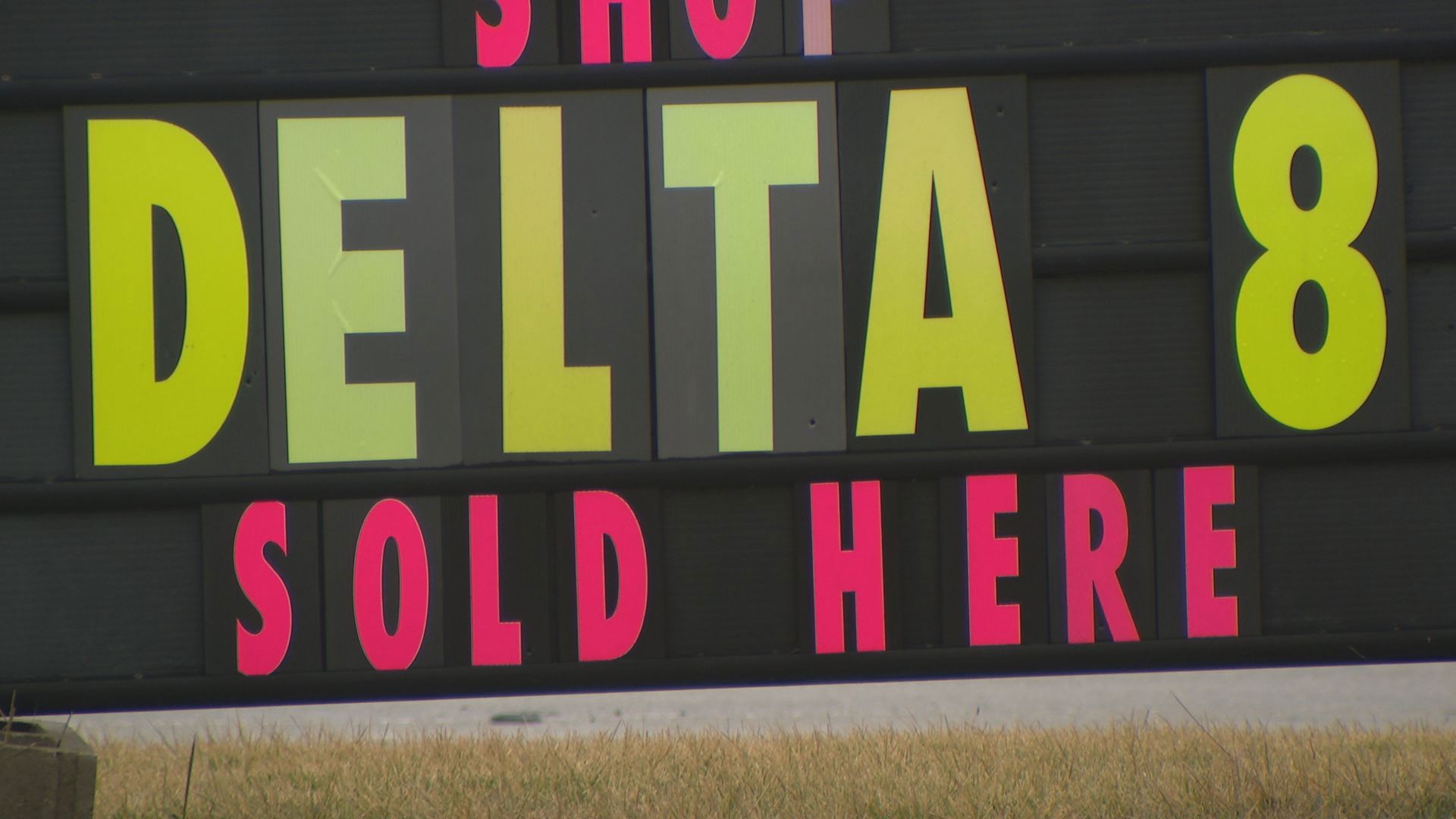INDIANAPOLIS — Indiana State Police has collected powerful evidence to help lawmakers and prosecutors crack down on illegal Delta-8 products being sold across the state, and the evidence is already prompting action.
An ISP investigation has revealed many Delta-8 products purchased from dozens of Indiana retailers contain levels of Delta-9 THC that exceed the state’s legal limit.
Equipped with ISP test results, prosecutors in two Indiana counties have already issued cease-and-desist orders, warning store owners to remove all Delta-8, Delta-9 and Delta-10 products from their shelves to avoid the risk of arrest.
The action by ISP and prosecutors follows a 13News hidden camera investigation that exposed how Indiana’s failure to regulate the controversial product and Delta-8 testing has led to chaos and confusion in multi-billion-dollar industry that continues to grow across the state.

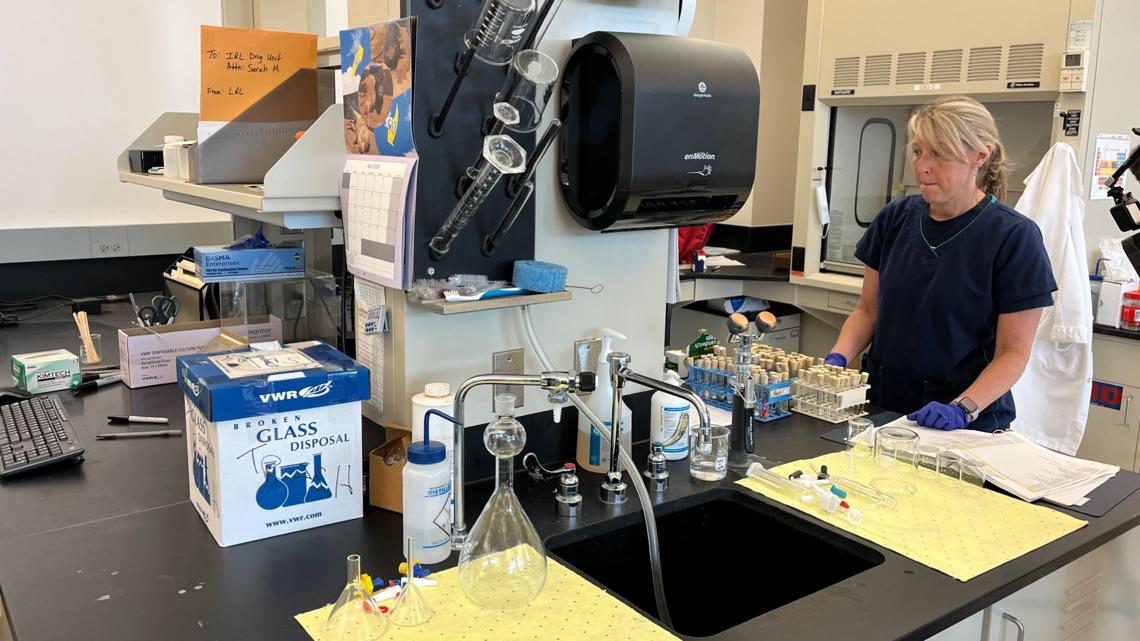
Marijuana’s “little brother”
Delta-8 is short for Delta-8 tetrahydrocannabinol, or Delta-8 THC. It is not the same as Delta-9 THC that’s found in marijuana, but it’s close.
Delta-9 THC in marijuana and Delta-8 THC are both cannabinoids that come from cannabis plants, and from a molecular standpoint they are nearly identical. Both can cause users to feel high, although Delta-8 THC is considered to be less psychoactive than the Delta-9 THC in marijuana.

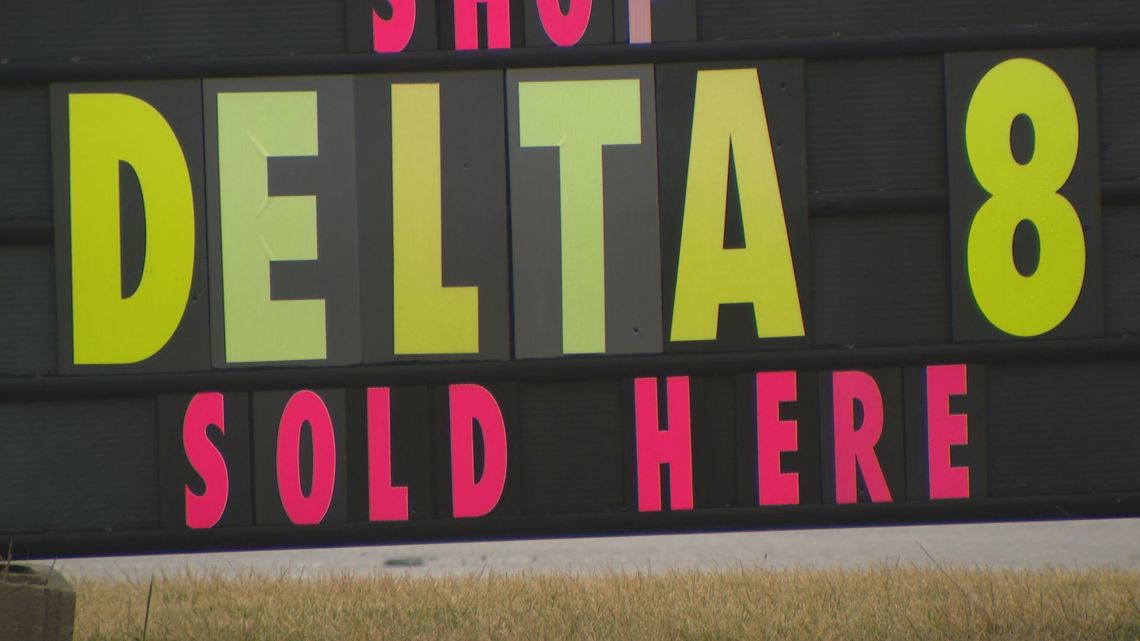
“It’s kind of like half the potency of Delta-9 THC,” explained Justin Journay, CEO of 3Chi, an Indianapolis-based company that produces millions of Delta-8 products each year. “It’s not as intoxicating, and so it’s a good option for people who find that cannabis is their best option for whatever it is they need, but they don’t want to be as high.” He said many 3Chi customers rely on Delta-8 products to help them sleep or to deal with chronic pain.
Unlike Delta-9, which occurs naturally in relatively high concentrations in marijuana flower, Delta-8 is usually found at low levels in cannabis plants and must be made synthetically. To mass produce concentrated Delta-8, most Delta-8 manufacturers rely on CBD extracted from cannabis that is then converted to Delta-8 THC through a chemical process.
At that point, it can be used to create countless products, such as gummies, vapes, cookies, drinks, concentrates, and pre-rolls (joints), and Delta-8 is now part of a multi-billion dollar industry.


To help you understand why it’s so popular, 13 Investigates visited Delta-8 retailers this spring with a hidden camera to hear store clerks candidly describe what Delta-8 products do.
“Do you want it to make you sleepy or to just feel high?” one store clerk asked when we inquired about Delta-8.
Another clerk called it “like a little brother” to marijuana, adding that he uses Delta-8 gummies to ease his joint pain.
Asked which Delta-8 product she recommends, a suburban smoke shop worker told 13 Investigates, “They're all gonna get you high. I'm not going to lie to you. Every single one of them’s gonna work. Some are just gonna work a little quicker or stronger.”
Is it legal?
Delta-8 manufacturers say their products are extracted from hemp and comply with the 2018 Farm Bill, which federally classifies all cannabis products containing less than 0.3% Delta-9 THC as legal hemp rather than marijuana.
Following the passage of the farm bill, Indiana legalized hemp products, and state lawmakers used the 0.3% Delta-9 THC cutoff to determine which “low THC hemp extract” products would become legal.
As a result, Delta-8 manufacturers insist their products comply with state and federal law — printing that right on their labels and websites — because they say the products contain levels of Delta-9 below the 0.3% threshold.

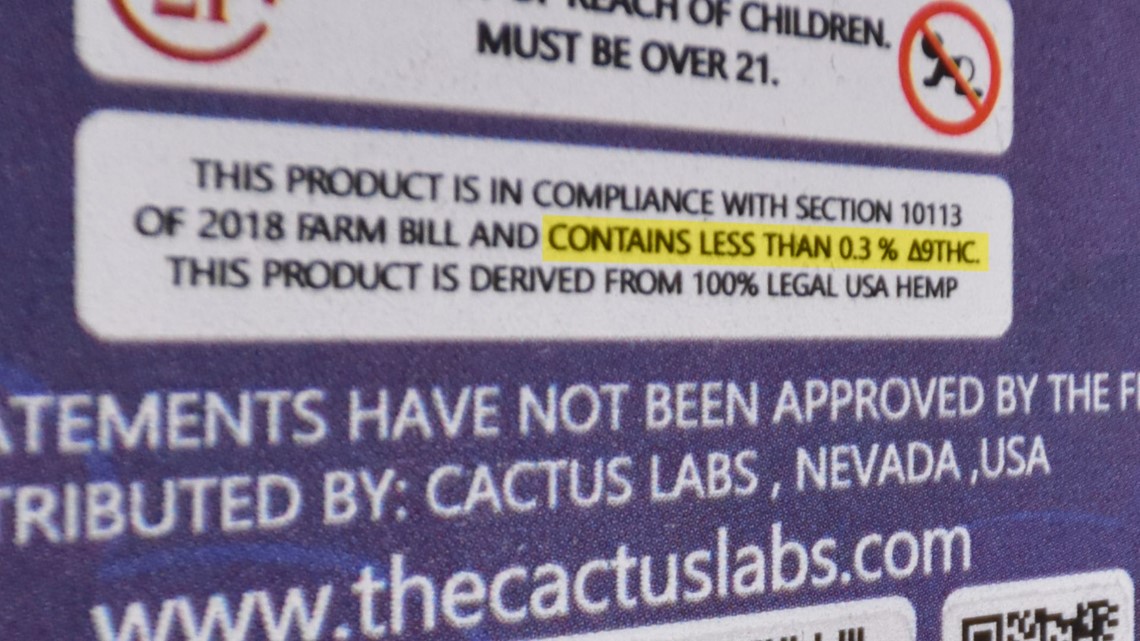
Last year, Indiana’s attorney general issued an opposing opinion stating products containing Delta-8 THC are not legal under state law because he believes they do not fall into the low THC hemp extract exception created by the General Assembly. The opinion says Indiana’s list of Schedule I substances “clearly includes derivatives” of cannabis plants with similar chemical structures and effects as marijuana.
Delta-8 manufacturers quickly sued the attorney general for that opinion, which initially triggered some law enforcement agencies and prosecutors to seek crackdowns on Delta-8 products in some parts of the state. But months later, as the lawsuit presses forward, sales of Delta-8 products appear to be flourishing in most parts of the state.
Law enforcement still has concerns about the products due to their psychoactive effects and widespread availability at corner shops and gas stations. And whether they truly comply with current state law continues to be a source of debate.
What’s actually in it?
To determine if Delta-8 products are compliant with the 2018 Farm Bill, and therefore compliant with Indiana law, 13 Investigates decided to test some of them.
13News bought seven Delta-8 products from area smoke shops and gas stations. The products included Delta-8 gummies, vapes, flower and joints purchased from stores in Indianapolis, Avon and Greenwood.
13News then sent the products to a certified testing lab near Lexington, Ky., that specializes in testing cannabis.
Test results provided by KCA Laboratories show all seven products do indeed contain Delta-8 THC, just as the labels suggested. The Delta-8 potency ranged from less than 1% in peach gummies and 5% in dried flower buds to more than 70% in some vapes and nearly 96% in a container of Delta-8 concentrate. Under Indiana law, there is no regulation limiting the potency of Delta-8.
But test results showed most of the products that 13News sent to the lab also contained something else.
“Five of the seven samples were found to have Delta-9 THC above .3%,” explained KCA Labs chief commercial officer Ryan Bellone. “Those products would not be considered legal in Indiana.”

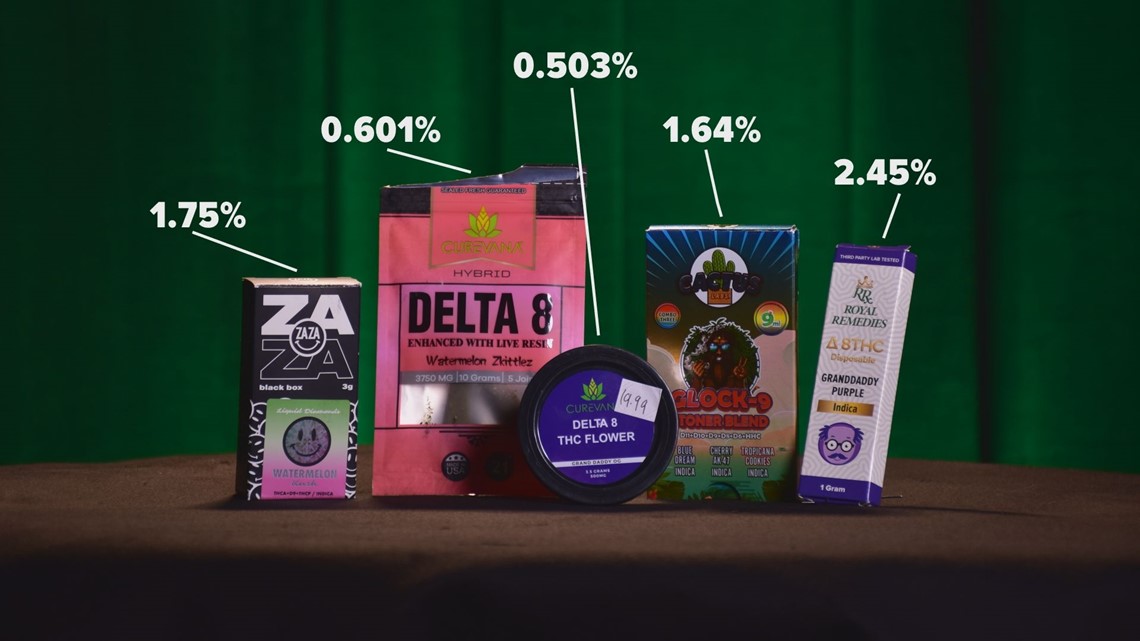
Bellone said the Delta-8 flower (0.503% Delta-9 THC) and joints (.601% Delta-9 THC) tested roughly twice as high for Delta-9 THC as the 0.3% allowed under state law.
Each of the Delta-9 vapes tested for 13 Investigates contained much higher levels of Delta-9 THC, testing between 1.64% and 2.45%, which is five to eight times the legal limit.
“I have grave concerns over these … and anybody that doesn't probably isn't paying attention,” said Indiana State Police Superintendent Doug Carter after reviewing 13News’ test results.
The superintendent said what concerned him most about Delta-8 products is they are highly unregulated and currently can be sold to kids. Based on the testing, he also worried that many of the products may be misleading consumers.
While the products tested for 13News have labels claiming they contain less than 0.3% Delta-9 THC, KCA Labs test results show most of the products contained more.
13 Investigates found an online lab report posted by one of the vape manufacturers for a product purchased by 13News. It shows the product actually contains 1.8% Delta-9 THC, even though the label claims it contains less than 0.3%. Testing by KCA Labs for 13News confirmed the vape contains a Delta-9 level that is five to six times higher than Indiana’s legal limit.
“That tells us what people are ingesting into their body is not what [the label] says,” Carter told 13News this spring, adding that vaping that much Delta-9 can result in someone failing a drug test, losing their job or facing felony drug charges. “Everybody that buys this should understand that what they're reading is sometimes not what they're getting.”
The 13News investigation also showed testing protocols for Delta-8 vary widely, producing test results that can, in many cases, hide or distort the actual amount of Delta-9 THC found in the products. Like most other states, Indiana has no standardized testing requirement for the testing of Delta-8.
Indiana State Police conduct testing statewide
Concerned about the unregulated spread of Delta-8 products throughout the state, Carter ordered his agency to conduct its own testing — on a larger scale than the testing performed for 13News — to provide data and guidance for state leaders.
Two senior ISP detectives purchased dozens of Delta-8 products from retailers in 10 different counties, and they sent the items to the Indiana State Laboratory for testing.

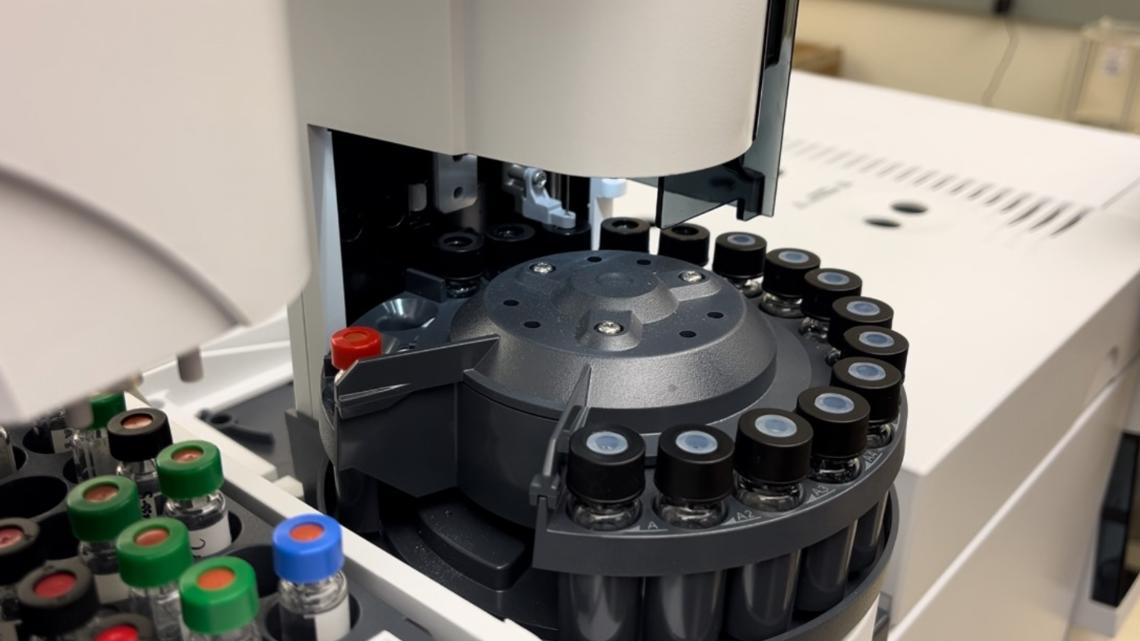
“It’s amazing what they learned,” Carter said as he reviewed a spreadsheet detailing the results.
The testing included 19 “edible” products such as gummies, chocolates and baked goods that are infused with Delta-8. Testing confirmed some of them contained high levels of Delta-8, and all of the edible products tested within the 0.3% legal limit for Delta-9.
But state testing on 55 products classified as Delta-8 vapes, waxes, flowers, dabs, joints and oils told a very different story. Of those 55 items, 42 of them (76%) contained concentrations of Delta-9 THC that exceed the state’s 0.3% limit.
More than half of those products tested at least three times above the legal limit, and some tested much higher.
According to the test results provided to 13News, Delta-8 wax purchased in Morgan County tested 12 times above the limit, a Delta-8 vape bought in Kosciusko County exceeded the Delta-9 limit by 18 times, and another vape obtained in Dearborn County tested more than 75 times above Indiana’s legal limit for Delta-9 THC.

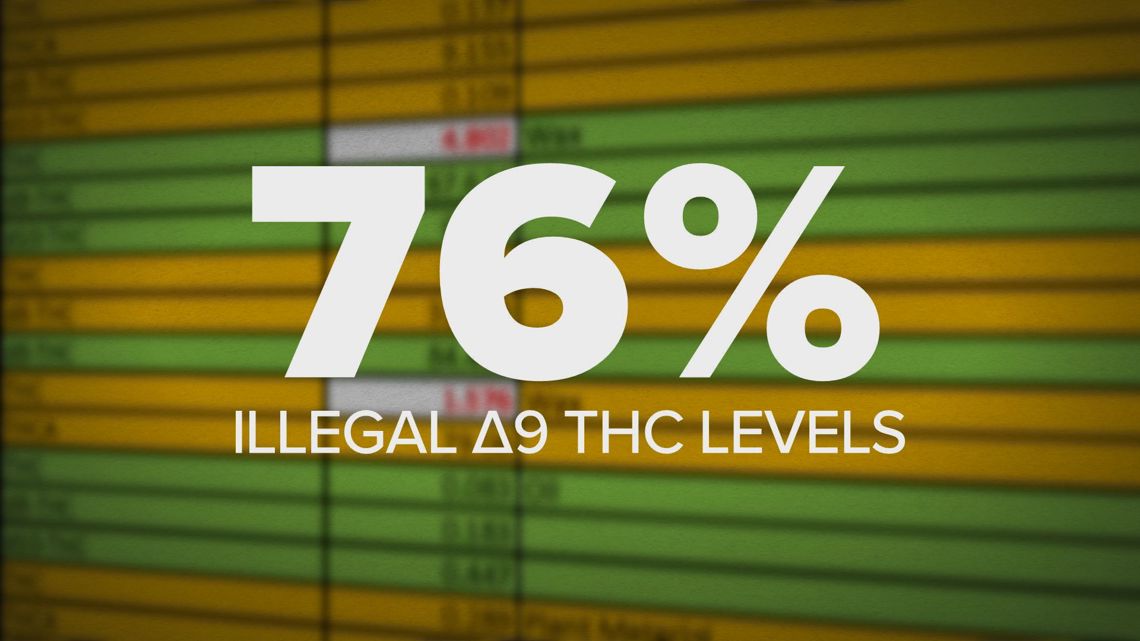
“It scares me to death. We’re selling intoxicants to kids and anyone who thinks that’s OK, I believe is wrong,” Cater told 13News. “There’s not any individual group that’s responsible for tracking it and testing it to see what’s actually being sold … [so] we’re selling a Schedule I drug over the counter, and now all of a sudden, at just about every gas station in Indiana, they’re selling these products pretty much unchecked.”
Prosecutors threaten criminal charges
State police shared its test results with county prosecutors, and some are now taking action.
Citing the state police testing, Cass and Vigo county prosecutors have been delivering warning letters to stores that sell Delta-8.
13News obtained copies of the cease-and-desist letters. They tell business owners, “If you continue to possess and/or sell those products, you (and/or your employees) could be charged with Dealing a Controlled Substance.” Depending on the amount of product, that charge could be a felony that could bring up to 30 years in prison.
The letters also say continuing to sell Delta-8 products could subject the businesses to search warrants, subpoenas, forfeiture proceedings, and other legal actions.
“A lot of people don’t realize what they’re getting is, in fact, illegal and dangerous,” Cass County Prosecutor Noah Schafer told 13News, adding that he sent the letters to local businesses to clarify his position that Delta-8 products are illegal. “The burden is and should be on people who are selling things to children to know what it is that they’re selling, and a lot of these retailers know that the manufacturers are not testing things appropriately and that there is no oversight of this testing and the packaging does not match the products. It’s irresponsible — it’s in fact criminal — for them to continue to do that.”
Asked whether he believes store owners and workers will be arrested in Cass County if they continue to sell Delta-8 products, Schafer responded, “I don’t anticipate arresting anybody because I anticipate perfect compliance, but the point of the letter is to say, ‘If it doesn’t change, arrests are possible.’ We do intend to be working with the state police to do some follow up investigations and make sure people are compliant.”


Schafer said his office has already hand-delivered or mailed warning letters to a dozen businesses around Logansport, and he expects about 40 other businesses will also receive them.
The Terre Haute Police Department says local law enforcement officers have been hand-delivering a nearly identical warning letter from Vigo County prosecutor Terry Modesitt, requesting that local businesses immediately cease the sale of products containing Delta-8 and other THC derivatives.
"Not only are these products illegal, but we regularly find them making their way into the hands of children and in our schools. We are also seeing more traffic related crashes involving THC being present in the blood of the drivers." Modesitt said in a statement posted one of the police department’s social media websites. "We have asked these businesses to stop selling these products in an effort to make our community and schools safer."
The Vigo County Prosecutor’s Office says letters will be delivered to about 70 businesses.
Prosecutors in Wayne, Vanderburgh and Huntington counties have previously sent similar letters to area businesses, threatening legal action against stores that did not stop selling Delta-8 products.
Disappointment over Indiana’s Delta-8 regulations
While both Modesitt and Schafer insist Delta-8 products are illegal — echoing an opinion issued by the state attorney general in early 2023 — the man who leads Indiana State Police said the legality of many Delta-8 products is still very unclear.
“I don’t know what the regulations are. That’s the problem,” Carter said. “There is still some confusion about where we stand with Indiana law.”
Asked about the many Delta-8 edible products purchased by ISP that tested within state guidelines and the Delta-8 vapes and waxes that did not exceed Indiana’s 0.3% Delta-9 THC limit, the Cass County prosecutor said his office would not take legal action against retailers selling those products.
“Obviously we’re not going to prosecute somebody who’s selling products that are below that legal threshold of Delta-9 THC,” said Schafer, adding that retailers need to understand whether the products on their shelves are subjected to proper testing. “The reports you did show the tests done by the manufacturers themselves aren’t subjected to a regulatory scheme and it’s not scientifically reliable. Stores need to have serious conversations with their [Delta-8] manufacturers about how those products are being tested or they’re going to wind up selling illegal drugs.”
Carter hopes his agency’s test results will provide state lawmakers with motivation to pass a law addressing Delta-8 products – something they have failed to do during each of the past five legislative sessions.
In recent years, members of the Indiana House of Representatives have introduced and passed multiple bills that would further clarify the legal status of Delta-8 and make it illegal to sell Delta-8 products to minors. But each of the bills has been killed by leaders in the Indiana Senate, who have not allowed the legislation to be considered for a full vote.
“It’s frustrating to watch,” said Carter. “Let’s at least have the debate.”
The lack of legislation has also frustrated Justin Swanson, president of the Indiana Hemp Council and an attorney who specialized in cannabis issues. He believes Delta-8 products that contain less than 0.3% Delta-9 THC are perfectly legal under the Farm Bill and Indiana law, and he says state lawmakers’ inability to pass meaningful Delta-8 legislation has resulted in the testing problems identified by ISP and 13News.
“There’s a lot of companies — mostly from the West Coast — dumping illegal Delta-8 products into Indiana right now with retailers who don’t know what they’re getting,” Swanson said. “There's no repercussions for selling essentially marijuana in Indiana out of the gas station.”


He pointed to states like Florida, Tennessee, Kentucky and Georgia that have recently passed Delta-8 regulations that support honest manufacturers and retailers while weeding out those who ignore regulations.
“So it’s unfortunate to see prosecutors sending letters to businesses, going with a kill shot for the whole industry rather than targeting the bad actors filling the state with illegal products,” he said. “We’ve been advocating to have a dedicated regulator for the marketplace and updates to Indiana’s consumer safety laws for packaging, labeling, testing and age restrictions. To see them going after retailers when there are better solutions is disappointing.”
Carter said he plans to meet with state lawmakers in the coming weeks to share ISP’s test results and to again ask them to tackle updated regulations to address Delta-8.
“To not be willing to hear these bills or to be afraid to talk about it is very disappointing, and if you want your 14-year-old to smoke it or take it, I guess you continue not to do anything about it,” he said. “I hate to be so direct, but that’s what this is about.”

